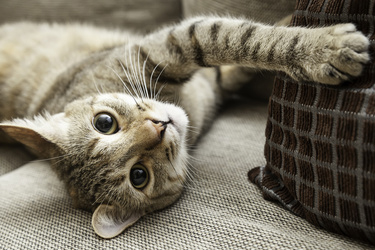Inform Pet Owners: 6 Symptoms of Eye Problems

January 6, 2017
When the appearance of an animal’s eye is noted to have an
observable change, an examination of the eye is warranted. While clients may
try to provide their pet with some relief, they need to know that an eye
problem can go from being a minor ailment to a serious condition in a short
period of time and that eye ailments should not be ignored.
Contact your Covetrus representative at 855.724.3461 for further information regarding the health of cats and dogs!
Give your clients the following information identifying the symptoms of eye problems in pets that need prompt veterinary attention.
6 Symptoms of Eye Problems in Pets that Demand Prompt Veterinary Attention
-
Eye Pain in Pets
There are a number of signs and symptoms that can be identified as the start of an eye disorder, but pain is the most serious. Any animal that is felt to be experiencing eye pain should be seen by a veterinarian as soon as possible.- Signs of pain include:
- Excessive tearing
- Squinting or closing the eye
- Tender to touch
- Light sensitivity
- Protruding nictitating membrane
- An animal with eye pain may also show a change in behavior; for
example,
- Loss of appetite
- Whining and crying
- Lethargy
- Pawing or rubbing at the eye.
- Eye pain could be caused by any of the following:
- Corneal injuries
- Inner eye disease, such as:
- Glaucoma
- Uveitis
- Keratitis.
- Signs of pain include:
- Discharge from the Eye
When the eye is observed to have discharge, the appearance of the discharge is often a symptom that points directly at the cause of the problem. For instance:- Clear discharge with no other signs or symptoms
- Problem with the tearing mechanism
- Clear discharge with a reddened eye, but no pain
- Possibility of conjunctivitis, from a viral infection
- Thick, sticky, mucus- or pus-like discharge and an
inflamed, red eye
- Possibility of conjunctivitis, from chlamydia
- Discharge accompanied with any of the signs of pain
- Indicates corneal or inner eye problem
- Thick green or yellow discharge, mucoid, possibly
sticking to the eyelids or to the hairs around the eye
- Infection or the possibility of a foreign body in the eye.
- Clear discharge with no other signs or symptoms
- Cloudiness of the Eye
Whenever an eye seems to have lost clarity or its appearance has changed so that it looks cloudy, the animal needs to be seen by the veterinarian. Cloudiness often gives the animal the appearance of having a blind eye.
Cloudiness can be a result of many eye ailments, of which several require prompt attention. For example:- Cloudiness, accompanied by signs the animal
is in pain
- Keratitis
- Glaucoma
- Uveitis
- Cloudiness, with no pain
- Cataracts
- Cloudiness that makes the eye appear as
uniformly blue-gray, with signs of pain
- Corneal edema
- Cloudiness, accompanied by signs the animal
is in pain
- Change in Eye Color
- Change in the color of the iris
- Indication that the animal has developed melanoma
- Sclera, or whites of the eyes, are
observed with a yellowish tint
- Jaundice
- Change in the color of the iris
- Hard or Soft
Eye
Disorders of the inner eye can cause changes in eye pressure and alter the firmness of the eyeball.- Hard eye refers to a pupil that
appears fixed and dilated
- Glaucoma
- Soft eye refers to a pupil that
is constricted
- Uveitis
- Hard eye refers to a pupil that
appears fixed and dilated
- Bulging or Sunken
Eye in Most Cat or Dog
Breeds
The eyes of some cat and dog breeds—for instance, Persians, Himalayans, and pugs—normally bulge. However, in most breeds, a bulging or sunken eye indicates a severe condition that requires prompt veterinary attention.- Bulging eye often occurs
with:
- Glaucoma
- Tumor
- Abscess behind the eye globe
- Eye out of its socket
- Eyes that appear sunken are
generally associated with:
- Dehydration
- Weight loss
- Eye pain
- Tetanus
- Bulging eye often occurs
with:
Inform Your Clients
Whenever a pet shows evidence of an eye problem, the animal needs to be examined promptly. Inform your clients to ensure they bring their pets to you at the first sign of an eye ailment.Contact your Covetrus representative at 855.724.3461 for further information regarding the health of cats and dogs!
Careers
Are you looking for a place to let your talents shine? At Covetrus, we help our practitioner customers better serve their patients and take pride in providing the best customer experience possible. Search our open positions to see our available opportunities.
Newsletter
Stay current with what’s going on with Covetrus, subscribe to receive our newsletter and email communications. Subscribers will receive the latest information in practice management, sales and marketing, animal health, and more.


Leave a comment